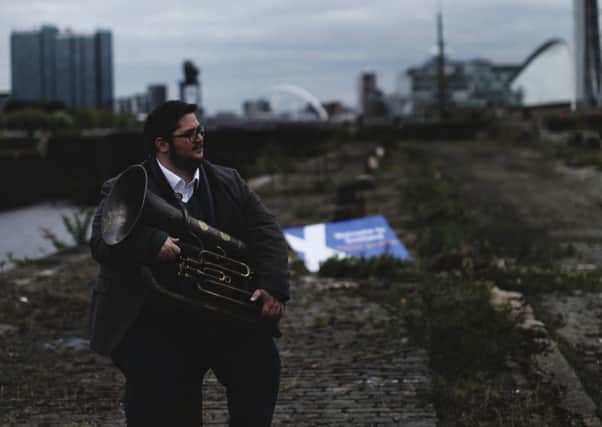Background music comes to the fore


De Simone thought a lot about his grandfather last year; his mother’s father was John MacCormick, the nationalist lawyer and politician who helped found the National Party of Scotland in 1928, which came together with the Scottish Party in 1934 to create a new political entity. In which case it’s true to say that MacCormick was one of the founders of the Scottish National Party as we know it today.
In researching the composition of this independence-themed musical suite for his group Ensemble Thing, the classically-trained tuba player visited his family on the Isle of Mull, exploring their history even as he filtered an understanding of Scottish music into his own repertoire. “I discovered there’s a reality to his life, rather than the myths I had,” he says, “which were very noble. The only thing I knew of my grandad, who died in 1961, was of Robert Carlyle playing him in the film Stone of Destiny. So I discovered that yes, he was a great man and I’m proud to be his grandson, but there was a cost – he took the government to court over the Queen calling herself Elizabeth II when there had never been an Elizabeth I in Scotland. He lost, and that basically ruined him.”
Advertisement
Hide AdThis heritage feeds into De Simone’s new work, but it’s neither a biography of his grandfather, nor a treatise arguing for or against independence.
“I was born and brought up in England, I’ve got a lot of love for England,” he stresses. “It’s not a binary choice for me, especially being Italian too [on his father’s side]. It was the tangible sense of community over the last year that was most seductive, of people working together for each other’s interests.
“To relate it to the piece, I was working with Ensemble Thing, people who I’ve known for years, and the first gig was a small one in Glasgow with my friends and family in the audience. That summed it up for me really, that’s what Scotland has going for it more than where I was raised in the south east, where everyone’s very segmented.”
The challenge was, how can these themes best be represented in the work? “It’s always a big question, how do you make something tangible out of history and an abstract piece of music,” he says.
Part of his research uncovered the fact that his great-grandfather had been a composer of pipe tunes and had written a song called The Lad That Returned No More, to be played at the cenotaph in Glasgow. De Simone adapted this piece into Independence, using it as a recurring musical theme. “I’m not a cultural tourist, or I try not to be, so I’m aware I’m not steeped in the Scottish musical tradition,” he says, “but as I was gifted this music I felt I could use it.”
There’s a variety to the eight movements which make up Independence, including a “strange sort of tango-reel hybrid” where he explores his Italian heritage, and a lot of his own contemporary classical influences. “In the piece there’s violin, cello, bass clarinet, double bass and accordion,” he says, “so it’s a very weighty, bassy sound, and then there’s some electronic soundtrack work. We’ve all played together for years so there’s a real virtuosity, a chamber quality. They’re great players. I guess post-minimalist is probably the best way to describe the sound, it has minimalist touches but it also has form and structure, and sometimes it’s just a bit of tune playing.”
Advertisement
Hide AdAmidst it all, he will tell us where the music – and he – came from. “I often feel that’s the problem with these types of performance,” says De Simone, “there’s very little context, very little actual desire to include the audience. Again, it’s about this notion of community. Composing is my ideal form of emotional communication, so in my speech I give context to each movement and draw a bit of humanity into it.
“Everybody wonders who they are, where they’re from, what it is that they’re doing, and the theme of personal independence is bigger than that of political independence. This is absolutely not about advertising the Yes vote; it was a journey that I went on because of my specific background, but music is open access and you can take your own interpretation from what we play.”
l Independence is at Summerhall until 23 August. Today 11:20am.